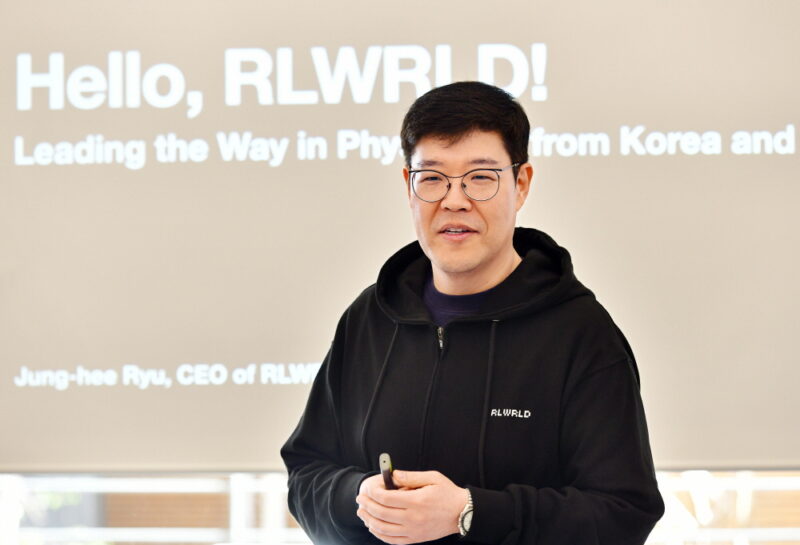RLWRLD, a Korean robotics AI startup founded by Joonghee Ryu after stepping down as CEO of FuturePlay following 13 years at the helm, has raised an approximately USD 15.2 million(KRW 21 billion) seed round. The company is developing a global Robotics Foundation Model (RFM) grounded in the strengths of Korean and Japanese manufacturing, designed for immediate deployment in industrial environments.


The funding round drew participation from prominent venture capital firms including Hashed, Mirae Asset Venture Investment, Global Brain (GB), and PKSHA Technology Capital. Several Corporate Venture Capital(CVC) funds from Korean and Japanese conglomerates such as LG Electronics, SK Telecom, and DRB Dongil from South Korea, as well as Japan’s KDDI, ANA Holdings, Mitsui Chemicals, and Shimadzu Corporation also joined as strategic investors.
RLWRLD aims to accelerate the development of practical, real-world robotics AI by leveraging large-scale, real-world industrial data—collected through collaborations with manufacturers in Korea and Japan—to train its models. While large language models (LLMs) have historically supported human cognitive labor in digital contexts, RLWRLD’s RFM is designed to enhance the efficiency of physical labor by embedding its AI models directly into robotic systems.
“AI has grown rapidly by learning from internet-based language data, but the next frontier is physical AI—systems that understand the real world and convert that understanding into action,” said Joonghee Ryu, CEO of RLWRLD. “Unlike the LLM space dominated by global tech giants, the RFM market is just beginning. Here, the real-world data and on-site expertise from Korea and Japan’s manufacturing sectors will be key differentiators.”
South Korea currently ranks third globally in terms of research output in RFM-related topics. RLWRLD is collaborating with top-tier AI researchers from institutions such as KAIST, Seoul National University, and POSTECH to build a high-caliber research team.
Shin Jinwoo, Chair Professor at the KAIST AI Graduate School and Chief Scientist at RLWRLD, stated, “While infrastructure limitations—like GPU shortages and expensive robotic hardware—have slowed RFM research, RLWRLD provides a rare environment that bridges the gap between research and real-world application. AI gains true competitiveness when trained on real-world data.”
RLWRLD is actively developing a proprietary AI architecture, manufacturing data-driven training platform, and interoperability technologies between AI models and robotic systems,
to create RFMs that are directly deployable in industrial settings.
The company is also co-developing a next-generation reference humanoid robot for RFM training in partnership with Wirobotics, and plans to collaborate with other robot manufacturers such as Robotis, Wonik Robotics, and Rainbow Robotics to expand RFM applications across various platforms. RLWRLD is also working with sensor companies like SOS Lab, AIDIN Robotics, and Bitsensing, as well as AI tech firms like Deeping Source, PLAIF, and Seoul Robotics, to build a robust RFM ecosystem.
Hashed CEO Seojoon Kim commented, “RLWRLD is uniquely positioned to drive innovation in the manufacturing sector by combining real-world data with advanced AI technology. Collaborations with global manufacturers are the strongest catalyst for commercializing RFM technology.”
Vice Chairman Eungseok Kim of Mirae Asset added, “The combination of FuturePlay’s deep tech experience, RLWRLD’s bold vision, and its partnerships across the industrial landscape will have a global impact.”
Yurimoto Yasuhiko, CEO of Global Brain, remarked, “RLWRLD has the potential to become a global leader in the RFM space by connecting Japanese manufacturing excellence with cutting-edge AI.”
RLWRLD plans to begin proof-of-concept (PoC) deployments in real industrial settings by the end of 2025, targeting major markets including South Korea, Japan, and the United States for technical validation.
“Our mission is to develop the world’s fastest and most practical RFM by building on decades of data and expertise from Korean and Japanese manufacturing,” said Ryu. “We intend to lead the global transformation toward physical AI.”
MORE FROM THE POST
- MEDISBY Secures Seed Funding to Advance AI-Powered Rehabilitation Robotic Arm and Global Expansion
- Raion Robotics Secures USD 16.5M in Series A Funding to Target the Global Robotics Market
- MetaFarmers Secures $2.3M Pre-Series A Funding to Advance Agricultural Physical AI Robotics
- Tefa Robotics Raises $1.45 Million in Pre-Series A Funding to Pioneer Physical AI for Industrial Robots
- ROAI Secures USD 1 Million Seed Funding to Develop AI-Powered One-Click Smart Factory
- EN
- funding
- futureplay
- Global brain
- Hashed
- humanoid robot
- investment
- Joonghee Ryu
- Korea
- Korean startup
- mega funding
- Mirae Asset Venture Investment
- physical ai
- PKSHA Capital
- RFM
- RLWRLD
- robotics
- robotics AI
- seed
Share
Most Read
- 1
- 2
- 3
- 4
- 5


Leave a Reply